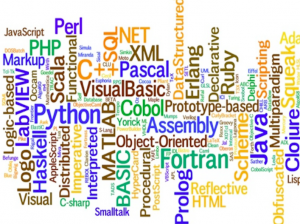
In this post, you will learn about different programming languages which can be used to create (train) machine learning models to solve supervised and unsupervised learning problems.
Here are the top 13 programming languages used for machine learning:
- R Language: R is one of the most popular programming language and environment for statistical computing and graphics.
- Python: There are some of the following Python libraries which makes it easy to create machine learning/deep learning models:
- Scikit-learn library (Classical machine learning models): Packages such as NumPy, SciPy, Pandas are very useful and helpful in creating supervised and unsupervised learning models.
- Deep learning models using python libraries provided by Tensorflow, PyTorch, Theanos, CNTK, MxNET
- Julia: Provides powerful tools for deep learning (Flux.jl and Knet.jl), machine learning and AI. Helps load multidimensional datasets quickly, perform aggregations, joins and preprocessing operations in parallel, and save them to disk in efficient formats. One can also perform online computations on streaming data with OnlineStats.jl
- Java (Weka): Data mining programming tool in Java, Weka is a collection of machine learning algorithms for data mining tasks. It contains tools for data preparation, classification, regression, clustering, association rules mining, and visualization.
- Lisp: List of common Lisp Machine Learning projects
- MGL
- MaLeCoLi, Machine Learning in Common Lisp.
- clml, Common Lisp Machine Learning Library.
- ML-Progs:More “Research-Level” Implementations of Learning Algorithms
- cl-bayesian, Common Lisp routines for Bayesian estimation and analysis.
- cl-decision-tree
- cl-mlep, a machine learning library for educational purposes
- cl-association-rules, an association rule mining library.
- cl-online-learning, a collection of online machine learning algorithms for linear classification.
- cl-random-forest, a fast implementation of Random Forest for multiclass classification and univariate regression
- Prolog: Another page on Prolog Machine learning.
- Octave: Here is the documentation on Octave. Covers topics on statistics such as the following:
- Matlab: Here is the detail on Machine learning using Matlab.
- Javascript: Here is a list of 8 javascript frameworks for machine learning. Apart from that, Tensorflow.js could also be used.
- C++: MLPack is a machine learning library, written in C++, that aims to provide fast, extensible implementations of cutting-edge machine learning algorithms.
- ML.NET: ML.NET is a free, cross-platform, open source machine learning framework made specifically for .NET developers. It is an extensible platform that powers recognized Microsoft features like Windows Hello, Bing Ads, PowerPoint Design Ideas, and more.
- Scala: Here is the list of machine learning / AI frameworks in Scala.
- Go: GoLearn is a machine learning library for Go.
Latest posts by Ajitesh Kumar (see all)
- The Watermelon Effect: When Green Metrics Lie - January 25, 2026
- Coefficient of Variation in Regression Modelling: Example - November 9, 2025
- Chunking Strategies for RAG with Examples - November 2, 2025

I found it very helpful. However the differences are not too understandable for me